Apr 2, 2024 12:59 PM
Saxophonist, Sonic Explorer Casey Benjamin Dies at 45
Casey Benjamin, the alto saxophonist, vocalist, keyboardist and producer who stamped his distinctive sounds on the…
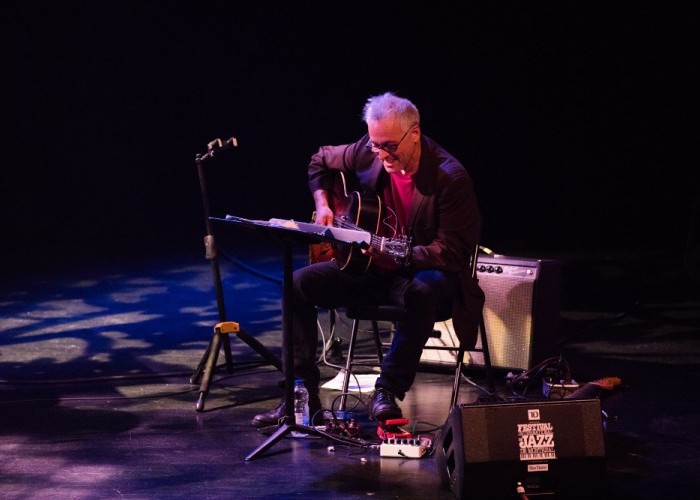
Marc Ribot performs at the Montreal International Jazz Festival.
(Photo: Frédérique Ménard-Aubin)Jazz historically has aimed for deep cultural relevance and a commitment to social justice, as vintage work by Charles Mingus, John Coltrane or Abbey Lincoln make abundantly clear. But for the past few decades, the music often has felt untethered from the broader culture, with hip-hop and indie rock boldly taking on that role. Concerts during the first four days of this year’s Montreal International Jazz Festival, which runs through Saturday, by Cécile McLorin Salvant, Keyon Harrold and Marc Ribot, plus one from the granddaddy of jazz resistance, Archie Shepp, strongly suggest that jazz might be busting out of its cultural and political isolation.
Salvant’s wry, subtle commentaries at the grand Théȃtre Maisonneuve on June 28—with Adam Birnbaum (piano), Paul Sikivie (bass) and Kyle Poole (drums)—were especially rich, since, in deference to the Quebecois audience, the 28-year-old singer often spoke and sang in French. Her set included Josephine Baker’s poignant “Si J’Étais Blanche (If I Were White)” and an even edgier “Darkies Never Dream” (recorded by Ethel Waters), which cut deep with its ambivalent mix of resignation and resistance. Salvant ended her set with a magnificent version of French singer Barbara’s world-weary masterpiece “Le Mal de Vivre,” exhibiting a breadth and scope that continues to expand at an astonishing rate.
Harrold is probably best known as the trumpet double for Miles Davis on the soundtrack to Miles Ahead, but with his 2017 album, The Mugician (Legacy), the 37-year-old has come into his own as a bravura, Charles Tolliver-inspired player with a fat tone and fiery flare. Hailing from Ferguson, Missouri, Harrold delivered a cinematic, hip-hop-influenced set at the atmospheric and intimate stone church venue Gesù.
Segueing from one album track to the next, Harrold and his sizzling band—Shedrick Mitchell (piano), Nir Felder (guitar), Burniss Earl Travis II (bass) and Charles Haynes (drums)—wore their politics on their sleeves. “When Will It Stop?” referenced tension in Ferguson and the Black Lives Matter movement, and at one point the band even played “We Shall Overcome.” Beyond protest, Harrold delivered music of silvery tenderness, singing “Her Beauty Through My Eyes” and “Stay This Way.” Paul McCartney might not have recognized the band’s closing version of “She’s Leaving Home,” but its expressive unpretentiousness and shamanistic intensity suggested that Harrold is definitely one to watch.
Ironically, the same day Salvant and Harrold performed, people gathered in Montreal to protest a different festival performance, SLĀV, billed as a “theatrical odyssey based on slave songs” performed by a predominantly white cast. As a result of the program, on July 3, singer Moses Sumney posted a statement to his Instagram account explaining a decision to cancel his appearance at the festival. It quickly spread over social media channels.
Three SLĀV performances took place and were sold out, according the festival’s website. But 13 subsequent performances eventually were canceled.
“Since the beginning of SLĀV performances, the Festival team has been shaken and strongly affected by all comments received,” a July 3 press release from the festival stated. “We would like to apologize to those who were hurt. It was not our intention at all. For the Festival International de Jazz de Montréal, inclusion and reconciliation between communities are essential. We made the decision with the artist Betty Bonifassi to cancel all performances of the show at the Festival.”
A few days prior to the cancellation, during his “Songs Of Resistance” show at Gesù, Ribot observed that refusing to “change the chord after four bars” is also an act of resistance. But Ribot, the musical iconoclast, said he felt that speaking out in these “strange times” was “a matter of now or never.” Hence, Songs Of Resistance: 1942–2018 (Anti-), the forthcoming album from which he drew most of his set list. Needless to say, he and his impassioned quartet—Jay Rodriguez (tenor saxophone, flute), Brad Jones (bass) and Reinaldo de Jesus (drums)—did not sound like Joan Baez in the ’60s.
Seated in a chair with a hollowbody guitar sometimes dampened to a dry, acoustic scratch, and reading lyrics from a music stand, Ribot vibrated with intense, abrasive rage, spitting Sprechstimme rants, the most compellingly repeatable being “Fuck La Migra,” a reference to the Trump administration’s border policies. Though Ribot apologized for his vocals (guest artists sing on the album), he delivered the anonymous hymn “We Are Soldiers In The Army,” the World War II Italian partisan anthem “Bella Ciao” and Mavis Staples’ inspiring “We’ll Never Turn Back” with power and passion. De Jesus’ percolating Latin percussion and Ribot’s exposed electric strum often recalled the pleasantly raw scrape of The Champs. Rodriguez played flute and tenor saxophone with astounding alacrity. Hopefully, this band will carry its timely message far and wide.
Providing historical grounding for these contemporary explosions was the elegant eminence of 81-year-old Shepp, who drenched the blonde wood slabs of the Maison Symphonique with guttural saxophone and vocal sounds deep from the heart. Though unashamed to exhibit the mellowness of maturity with lovely renditions “in the tradition” of Duke Ellington (“Don’t Get Around Much Anymore,” “Come Sunday”) and Count Basie (“One O’Clock Jump”), Shepp still had fire in his belly. Declaiming his poem “Revolution,” with its still-pertinent references to Mississippi, Georgia and Chicago, as well as the classic “Steam,” written for his slain cousin in Philadelphia, Shepp projected his signature piping tone on tenor saxophone, rambling over the time and injecting wows and curls into his lines, and singing blues verses with relaxed and throaty conviction, ably supported by Carl Henri Morrisset (piano), Avery Sharpe (bass) and Ronnie Burrage (drums).
From Shepp to Ribot, Harrold and Salvant, it was easy to draw a direct and welcome line. May it signal more of the same from other quarters in jazz. DB
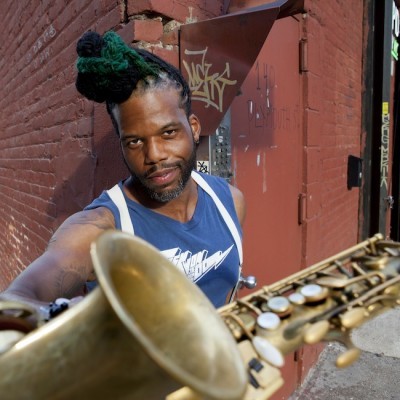
Benjamin possessed a fluid, round sound on the alto saxophone, and he was often most recognizable by the layers of electronic effects that he put onto the instrument.
Apr 2, 2024 12:59 PM
Casey Benjamin, the alto saxophonist, vocalist, keyboardist and producer who stamped his distinctive sounds on the…
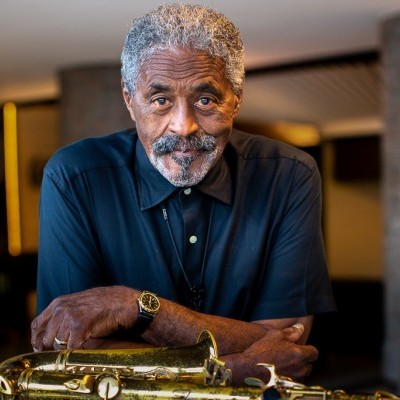
“He’s constructing intelligent musical sentences that connect seamlessly, which is the most important part of linear playing,” Charles McPherson said of alto saxophonist Sonny Red.
Feb 27, 2024 1:40 PM
“I might not have felt this way 30 to 40 years ago, but I’ve reached a point where I can hear value in what people…
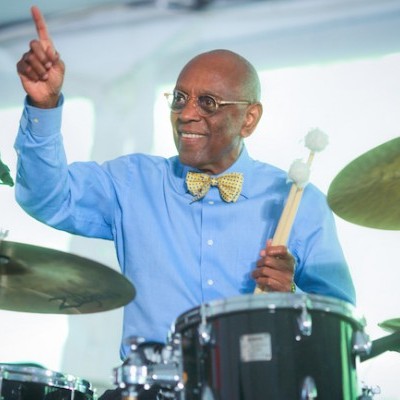
Albert “Tootie” Heath (1935–2024) followed in the tradition of drummer Kenny Clarke, his idol.
Apr 5, 2024 10:28 AM
Albert “Tootie” Heath, a drummer of impeccable taste and time who was the youngest of three jazz-legend brothers…
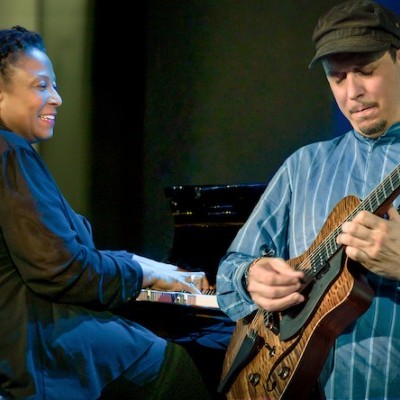
“Both of us are quite grounded in the craft, the tradition and the harmonic sense,” Rosenwinkel said of his experience playing with Allen. “Yet I felt we shared something mystical as well.”
Mar 12, 2024 11:42 AM
“There are a few musicians you hear where, as somebody once said, the molecules in the room change. Geri was one of…
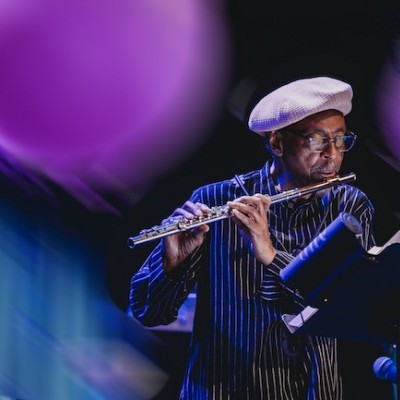
Henry Threadgill performs with Zooid at Big Ears in Knoxville, Tennessee.
Apr 9, 2024 11:30 AM
Big Ears, the annual four-day music celebration that first took place in 2009 in Knoxville, Tennessee, could well be…